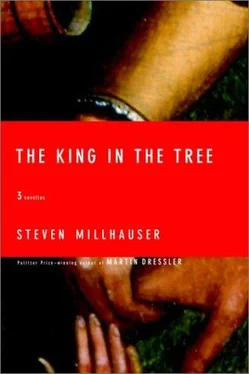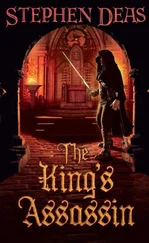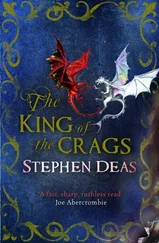Tristan, leaving his party to follow his own path, had come upon a young knight who lay bleeding beside a stream. The knight had been set upon by four brothers, one of whom was Foulques de la Blanche Lande, a cruel lord of these parts — a man of gigantic stature and ruthless will, who rides wherever he likes, hunts in Tristan’s forest, slaughters harts in the close season, and attacks whoever stands in his path. Tristan set off after the murderous band. He found them in a clearing and a desperate battle began, in the course of which Tristan slew three brothers but was wounded in the thigh by a spear hurled by Foulques de la Blanche Lande. Despite his wound, Tristan battled until the leaves were red with blood, and at last left Foulques de la Blanche Lande dead among his dead brothers. Faint from loss of blood, Tristan managed to mount his horse, which carried him in the direction of the hunt. His men led him back to the castle.
Our party returned at once to the castle, where Tristan lay in his chamber recovering from his wounds.
But the spear wound troubles us. At first it seemed a mere misfortune, an ugly wound in the upper thigh of his left leg. But the infection worsens. The physician says that the tip of the spear was dipped in poison. He has bathed the wound in white of egg and wrapped it in strips of linen. We watch the leg swell alarmingly. Tristan’s face is hot and the skin of his leg is yellow. He lacks the strength to rise from his sickbed.
The physician has restricted his diet to barley water mixed with honey and, at night, the milk of crushed almonds.
It is feared he is dying.
I think of Tristan, with noble rage in his heart, setting off to do battle with Foulques de la Blanche Lande. An act of daring and courage, certainly — the sort of high deed, worthy of a minstrel’s song, that makes Tristan beloved wherever he rides. And yet, in the heart of his audacity, is there not some darker and more equivocal element? Tristan, immured in a mock marriage of his own devising, tormented with longing, desperate for a way out, haunted by weeks of bliss in the Forest de la Roche Sauvage — will he not feel something terribly alluring about a fight to the death, a fight in which death might no longer refuse him?
So: Tristan wounded, Tristan dying. For it is clear he must die unless his wound can be healed.
He has asked me to send for the Queen. “You have always been true to me,” he said, seizing my arm. I looked at him in amazement. He looked back at me tenderly, and again asked me to send for the Queen.
Every morning four servants carry Tristan down to the sandy strip of shore under the cliff, to wait by the sea for the Queen. He believes that only she can save him — she who cured him of his wound in Ireland, when he went courting for the King. The drama of Tristan’s waiting, the drama of his daily descent to the beach, where he lies on two quilts beneath a purple coverlet sewn with gold, his head propped by silk pillows, facing the waves, is heightened by the drama of the sails: he has so arranged it that if the Queen is on the return ship, the sail will be white, but if she remains in Cornwall, the sail will be black.
In the morning we search the horizon, our hands shading our eyes, as green waves thunder at our feet and sea spray salts our lips. In the afternoon, in Tristan’s chamber, we look down at the sea stretching off to the sky; we strain our eyes to discover the precise line where sea and sky meet and where, at any moment, a sail, a white sail or a black — life or death — will appear.
How like Tristan that, even in the grip of death, he cannot forgo a taste for striking effects.
Every day he grows weaker. I think: his life has become nothing but the act of waiting. And at once I am reminded of the Queen, going out each night to the orchard, sick with longing, feverish and weary with anticipation — a life lived solely in the future, like that of a fanatical monk who has renounced this world and devotes himself entirely to the realm of heaven.
Tristan longs for the Queen, lives only for the Queen, who alone can cure him, but as he lies on the beach, searching the horizon for the white sail, death must seem not without its attractions. If she comes to his rescue, what then? Back to life, a life of bitterness and suffering, of mock marriage, of impossible separation, of unappeasable love. As he lies on the beach, deafened by the roar of the waves, does he not, in his heart of hearts, long for the black sail?
Ysolt of the White Hands, silent and melancholy, watches with him from the beach, sits with Tristan in his high chamber.
What to say? It is tempting to write no more, to abandon myself to the consolations of silence. I have grown to like the sea, the mindless fall of waves, the wheel of birds, sea-salt and wave-spray. Can it be that I am tired of human beings and their passions? But my hand moves, a force compels me to continue, as though the words I write no longer are mine, but belong to the page alone, which knows nothing, which understands nothing, which suffers nothing. So be it.
Yesterday: a day of storm and sun. Black clouds and rain all morning, then the sun streaking through in lances of light. Tristan, in his chamber, was too weak to raise his head. I sat beside him, struck by his almost boyish beauty — as if death, by eating his flesh and muscle, by ruining his hardness, were restoring his childhood. It is dangerous to have the beauty of Tristan. At twelve years old, at fourteen, he must have had to prove his strength tirelessly, to demonstrate that the lovely boy could throw a spear, kill a boar, strip a hart, thrust his sword between a man’s ribs. Now he lay in his bed like a child with a fever. Ysolt of the White Hands sat in the stone window seat, looking out to sea. I could feel the thud of waves on the skin of my arms. I watched her at the window. Her young body was alert and oddly languorous — at any moment it might spring into motion or drift into deep sleep. She too was waiting— waiting for Tristan to touch her into life. Suddenly her body tightened, as if she had been struck by the flat of a sword. “A ship!” she said. Her hand in her lap was a fist.
Tristan struggled to sit up and lay back gasping. “The sail?” His voice was soft, tender, though I saw he was trying to shout. “The sail.”
She leaned her body through the open window, as though to get closer to the ship.
“Black,” she said.
I saw the change in Tristan — the terrible stillness, the look, directed to me, of piercing sweetness and desolation. A dark flush burned along his cheek. I seized his hand, which did not return my pressure. He continued to gaze at me with that childlike sad doomed stare.
“Are you sure?” I shouted — someone had to shout — and shaking myself out of a trance of sorrow I released him and went to the window. On the horizon I saw a little ship. The sun was shining. The sail was white as snow.
“Tristan!” I shouted — was mine the only voice in that room? — and for a moment I hesitated. I looked at Ysolt of the White Hands. She was gazing at me bitterly, gazing at me with such hatred that I felt a sudden fear of her, as if she were a wizardess come to damn us all to hell. Her look was like a knife-thrust aimed at my eyes. I understood what she had done, and still I hesitated — hesitated as though I were bound in the spell of that look — hesitated for only a moment more before shouting, “White! Tristan! The white sail!” I found myself at the bed, gripping Tristan’s hand, shouting the color of the sail long after I knew he could hear nothing.
That monstrous hesitation! Had I acted immediately, would I have saved him? And though I was startled by Ysolt’s bitter look — a look I hadn’t known the gentle, sad girl had inside her, growing secretly, ready to leap into her face like the revelation of a disease — it is also true that I had hesitated even before I turned to catch that look. I was taken aback— surprised by whiteness — bewildered: yes. But isn’t it also true that, far down in my mind, where no light penetrates, I wanted the sail to be black, isn’t it true that the whiteness horrified me, with its promise of more love, more ruin — that, in this matter of Tristan and the Queen, I was already on the side of death?
Читать дальше












